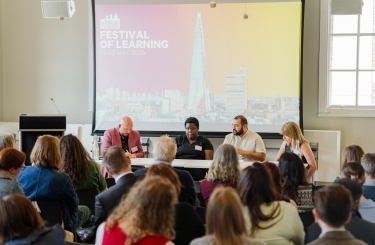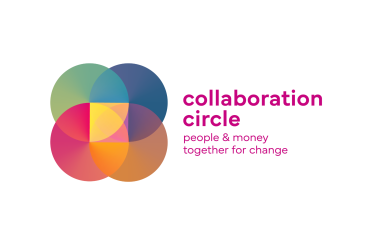Related



Last month, we kicked off our latest learning question on systemic change, spurred on by the conversations from this year’s Festival of Learning which called for more radical solutions to the entrenched problems facing our communities.
As part of this, we’re bringing learning together from friends and members to deepen our understanding of what it takes to fund and work in ways that truly drive systemic change. We recently spoke with Leah Black who leads the development of a new, ten-year fund in Edinburgh, Regenerative Futures Fund, about the lessons from working collaboratively to develop a vision and a fund that helps tackle poverty, the climate emergency and racial injustice in the city.
The Regenerative Futures Fund is a new fund and a new way of working in Edinburgh. It’s going to be a pooled fund linked to Edinburgh City’s aims of End Poverty and Net Zero by 2030, so it will have a focus on poverty, the climate emergency and racial justice in the city.
The whole fund has been co-designed over two years, and during this time we’ve done a lot of detailed work with funders, community organisations and individuals with experience of poverty. We’re intentionally taking a systemic approach, with the aim of working long-term to get to the root causes of those issues.
It will be a 10-year, £15 million fund, hosted by Foundation Scotland. We have a first stage target of £6 million which we’re on track to reach so that we can launch the first phase of the fund this year. The fund will support a cohort of community organisations with up to £100,000 a year. They’ll work together as a cohort, but also with other partners in the city - including funders- working across different layers of the system in the city so we can see a real shift in power to communities to lead change in Edinburgh.
We’re trying to raise the £15 million upfront so we can really commit to the long-term ambition of this fund. So, the first phase is of the funding that we’re launching later this year is all about capacity building, where a larger cohort of organisations will receive funding to do some developmental work around whatever it is they need to do to be able to hold this money for over 10 years. It’s all quite new for everyone – funders and organisations – to have funding for that amount of time so we want to give organisations some time to explore what they need, whether that’s around governance structures, how they collaborate on a hyper-local level or something else. The first phase will fund about 25 organisations before it’s narrowed down to 10-15 organisations that’ll receive the long-term funding.
To make decisions about what gets funded, the intention is to shift power to those who normally don’t have power in deciding where resources flow. The decision-making panel will be people with experience of poverty as well as advisors who are there to help the panel and plug any gaps in knowledge. We want that panel to be involved for the duration of the ten years and that’s part of our approach to systems change – quite often with participatory decision-making, people are brought in at certain points, make the decision and then they don’t really stay involved to the end. Members of the co-design group who have experience of poverty have been very happy they’ve been involved since the very beginning and the aim is for them to stay involved at every step of the process.
We don’t necessarily need new ideas, we need to match the good ideas and work already happening with resources and do that in a flexible way
One of the reasons we’ve been able to co-design the fund in this way is because of the flexibility we’ve had from funders. We initially had funding to develop the fund for a year but that has been extended twice. There have been different contributing funders who have all believed in this and have been involved in our community of practice so we’ve ended up doing quite systemic work with funders. I think for many funders, they have something around systemic change in their strategies and a desire to work in this way, but quite often they’re struggling to actually work out what action they should be taking around systemic change.
Because they’ve been part of this co-design process very actively, funders have recognised the value of resourcing it flexibly and being patient with the process. It’s meant we could be quite intuitive with how we designed it and I think that’s a real learning point – how important it’s been to have a whole year or more, a kind of ‘year zero’ to develop and co-design what working systemically and long-term really means.
Another key ingredient in the co-design process has been our facilitators who have experience and expertise of anti-racism practices and participatory decision-making. They’ve offered a lot of support and mentoring throughout this process.
I also think it’s helped that I’ve been seconded to an organisation like EVOC (Edinburgh Voluntary Organisations’ Council) and that I’m not leading this work from a funding organisation, where I might have been bound by organisational rules and a mindset of how things have to be. There’s something quite special about being able to develop this new and emergent work while working at an organisation that is a bit further removed from the process.
One of the big challenges is around decision-making. You can be working with people who are very senior in their organisations and then they take it away into their own decision-making context and that's where things get stuck.
How do you continue that collaborative and systemic way of working up into organisations’ own layers of governance and decision-making?
I think a lot of people who are doing this kind of work are facing that constantly and because things can get stuck, trying to create systemic change takes a long, long time. It can take 18 months to get a decision, so everybody has to be willing to stay consistent with the work and the ambitions. I’m often thinking about what support people need to be able to go back to their organisation and make the case for something that is quite different to what they normally do. That’s why I love the idea of the Collaboration Circle (London Funders' new space for pooling funds) because it makes it easier for people to work in more systemic and ambitious ways.
Maybe rather than overwhelmed, I’ve felt frustrated at points at why things can’t move more quickly. But I think what really helps is having people around you who act almost like cheerleaders – people who are not necessarily involved in the work but who you can talk to when things get tricky or stuck. There’s something special about having people who can stand in solidarity with you and cheer you on when it feels difficult.
I would encourage them to find out what is happening already in local places rather than thinking that you can design a program from your funding organisation. There’s something quite interesting about not assuming that because something works in one place, it’s going to work in another.
If you want to fund differently, you need to act differently as a funder
Don’t power into place-based work without finding what’s happening – what funders should be doing is adding resources to the good work that’s already underway. We don’t necessarily need new ideas, we need to match the good ideas and work already happening with resources and do that in a flexible way.
This goes back to having a ‘year zero’ – that developmental work which needs to be funded in a really flexible way to allow people to be very intuitive with the process and develop something that's right for a particular place. When we got the first million committed to the Regenerative Futures Fund, that opened more doors for us and made it easier to make the case to other funders to invest in this work. So, I would say to funders, don’t underestimate the huge value of putting your money in and taking that risk. I think we’re going to see (and we already are seeing) so much amazing work happening across different places with people taking a mix of approaches but all working towards long-term change that we can learn from.
If you are interested in more learning from the Regenerative Futures Fund, check out their website here.


